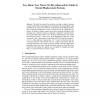Free Online Productivity Tools
i2Speak
i2Symbol
i2OCR
iTex2Img
iWeb2Print
iWeb2Shot
i2Type
iPdf2Split
iPdf2Merge
i2Bopomofo
i2Arabic
i2Style
i2Image
i2PDF
iLatex2Rtf
Sci2ools
DNA
2011
Springer
2011
Springer
Less Haste, Less Waste: On Recycling and Its Limits in Strand Displacement Systems
We study the potential for molecule recycling in chemical reaction systems and their DNA strand displacement realizations. Recycling happens when a product of one reaction is a reactant in a later reaction. Recycling has the benefits of reducing consumption, or waste, of molecules and of avoiding fuel depletion. We present a binary counter that recycles molecules efficiently while incurring just a moderate slowdown compared to alternative counters that do not recycle strands. This counter is an n-bit binary reflecting Gray code counter that advances through 2n states. In the strand displacement realization of this counter, the waste—total number of nucleotides of the DNA strands consumed— is O(n3 ), while alternative counters have Ω(2n ) waste. We also show that our n-bit counter fails to work correctly when Θ(n) copies of the species that represent the state (bits) of the counter are present initially. The proof applies more generally to show that a class of chemical reactio...
| Added | 18 Dec 2011 |
| Updated | 18 Dec 2011 |
| Type | Journal |
| Year | 2011 |
| Where | DNA |
| Authors | Anne Condon, Alan J. Hu, Ján Manuch, Chris Thachuk |
Comments (0)

